How Many Eggs Does A Chicken Lay A Day?
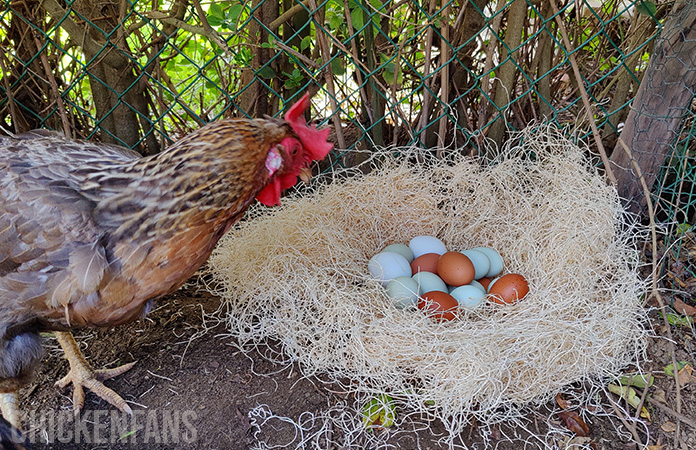
Chickens are among the most efficient domesticated backyard animals because of their excellent egg-laying skills. Understanding how many eggs they will bring you is essential information for you as a farmer or homesteader. But how many eggs does a chicken lay a day? And is it possible for a chicken to lay more than one egg per day?
Let’s find out.
How Many Eggs Does a Chicken Lay a Day?
Normally, it takes 24 hours for a chicken to develop and lay an egg, so they usually won’t lay more than one egg per day. Most chickens won’t produce eggs daily, with hybrid chickens laying up to 6 eggs per week and heritage breeds around 4-5 eggs weekly.
A chicken’s egg production depends on many factors, such as breed, age, health, and living conditions. Laying hens will bring fresh eggs on a daily base, and will probably lay up to 6 eggs weekly during their first laying year. Heritage breeds lay less, but some will still lay 5-6 eggs weekly.
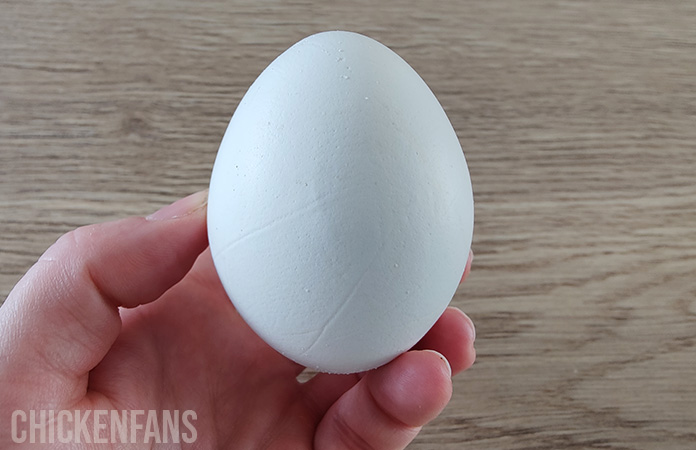
Can a Chicken Lay More Than One Egg Per Day?
Yes, although it’s very uncommon and is probably the result of an anomaly in the egg-producing cycle. There are three possible reasons why a chicken can lay two eggs within 24 hours:
- An egg gets stuck in the uterus until the next egg arrives
- The ovary releases two eggs simultaneously
- The first egg takes a little longer to develop, and the second egg ‘catches up’
If you want to learn more about this fascinating topic, please read our in dept ‘Can Chickens Lay Two Eggs A Day‘ article.
How Many Eggs Can I Expect?
The number of eggs your flock will bring you depends on numerous factors, such as breed type, age, health and living conditions, so it is a tricky question. Most hybrid hens will produce an egg (almost) on a daily base, while many heritage breeds will lay up to 3-4 times per week.
Hybrid chickens lay more eggs than heritage breeds. Hybrid chickens are a crossbreed of two or more chicken breeds, created to bring many eggs and to be low in maintenance. Heritage breeds are purebred chickens that have been selectively bred for generations, often for specific traits such as physical characteristics.
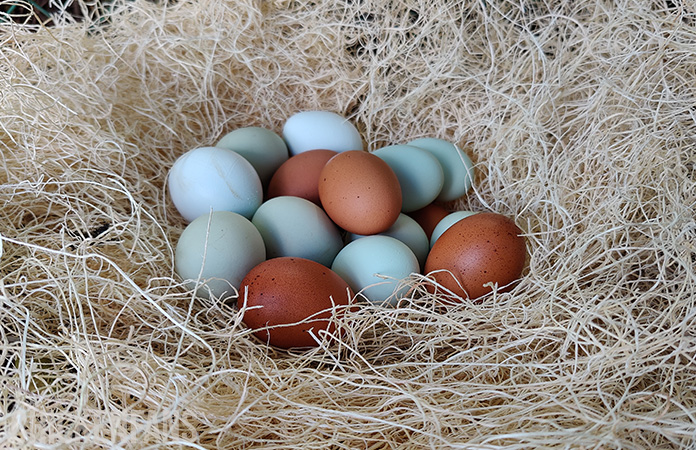
Hybrid chickens are commonly used in commercial egg farms due to their high productivity. While heritage breeds are favored by small-scale farmers or backyard chicken enthusiasts looking for a unique flock.
Chickens are the most productive in the first two to three years of their life. After that, egg production will eighter slow down gradually (heritage chickens) or abruptly (hybrid chickens).
Examples of Common Hybrid Chickens
There are many hybrid chickens available on the market, most are created by commercial hatcheries to create great egg-laying birds that are family-friendly and low in maintenance. Some are created to lay a particular color of eggs or have a unique look.
Commercial poultry producers favor hybrid chickens because they have high productivity and efficiency. They are bred to bring many eggs in a short period of time and grow rapidly.
Hybrid chickens don’t breed true. If you mix two hybrid parents, for example, two Golden Comets, their offspring won’t be a Golden Comet but a second-generation hybrid chicken.
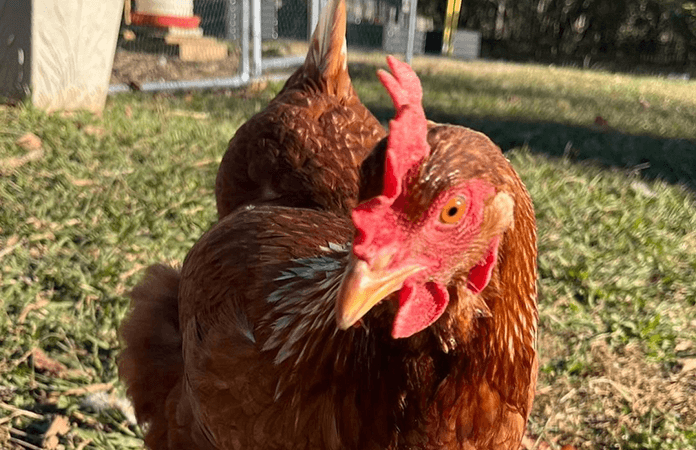
Let’s review some of the most popular hybrid chickens and the number of eggs they bring.
- ISA Brown: 320 eggs yearly
- Cinnamon Queen: 250 eggs yearly
- Smokey Pearl: 200 eggs yearly
- Green Queen: More than 300 eggs yearly
- Golden Comet: 300 eggs yearly
- Calico Princess: 300 eggs yearly
- Mystic Onyx: Up to 220 eggs yearly
- Sapphire Gem: Almost 300 eggs yearly
- Prairie Bluebell Egger: 240 eggs yearly
As you can see, all hybrid chickens from this list lay at least 200 eggs per year, and most more than 300 eggs. That’s up to 6 eggs per week. These chickens also keep on laying during winter and are seldom broody. This makes them real egg machines! They are also often bred specifically to lay blue or green eggs.
Keep in mind that hybrid chickens are most productive in the first year but significantly drop egg production after two years. Most hybrid chickens won’t live longer than the age of four.
What are Heritage Chickens?
A heritage breed in chickens s a purebred chicken that has been selectively bred for generations. Heritage chickens always breed true. Two parents of a heritage breed, for example, a Wyandotte, will always bring Wyandotte offspring.
Heritage breeds lay fewer eggs than hybrid egg machines, but some still bring plenty of eggs to the table. They will also keep on laying into older age, whereas hybrids will stop producing eggs after three years.
Examples of popular heritage breeds and the number of eggs they will bring you.
- Rhode Island Red: Up to 250 eggs per year
- Leghorn: 300 eggs per year
- Cream Legbar: 250 pastel-colored eggs yearly
- Wyandotte: 200 eggs yearly
- Plymouth Rock: 200 eggs yearly
- Orpington: 250 eggs yearly
- Australorp: Up to 300 eggs yearly
- Sussex: 250 eggs per year
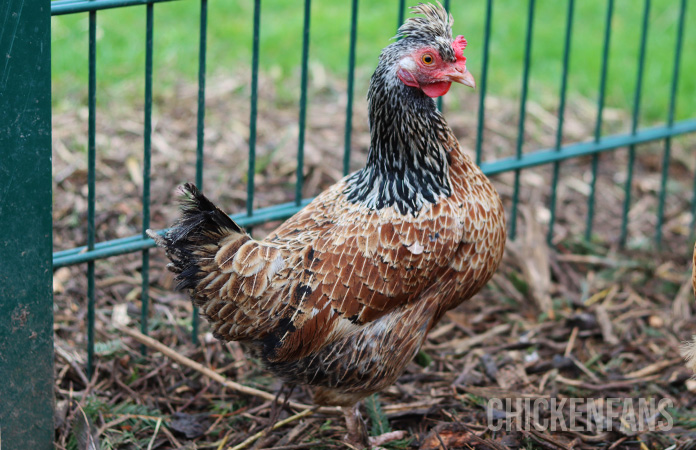
Plenty of heritage breeds lay a more than decent amount of eggs. Generally, chickens continue to lay eggs well into their old age, usually until they are around 6 or 7 years old, and they can live for 10 years or more.
However, some breeds are primarily ornamental and not known for their egg-laying capacity. Examples of such breeds include Silkies, Ayam Cemani, and Polish chickens. These breeds do lay eggs, but their production is relatively low, usually one or two per week.
Do Chickens Lay Every Day?
Most hybrid chickens tend to lay almost daily and will bring you around six eggs per week. Egg-laying heritage breeds, like a Legbar, sometimes take the day off but still lay around four to five eggs per week. On average, a chicken lays three eggs per week.
It’s important to mention that next to the breed, age is also an important factor affecting a hen’s egg-laying capabilities. In general, most hens, hybrid, and heritage, will lay eggs consistently for about 2-3 years, with the highest levels of egg production occurring in the first year.
After that, egg production will eighter slow down gradually (heritage chickens) or abruptly (hybrid chickens).
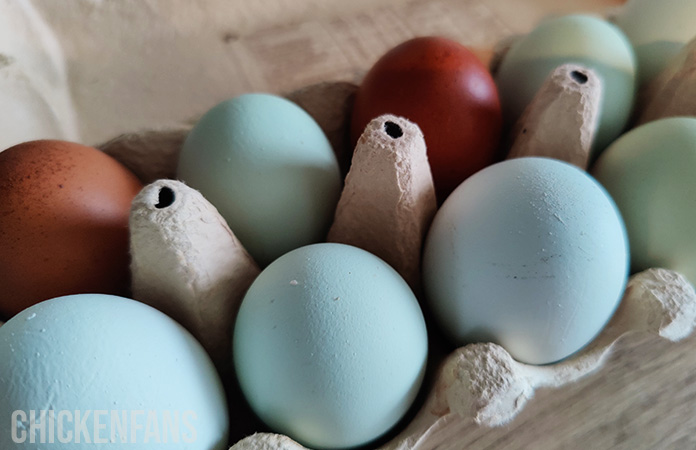
Hybrid chickens mostly won’t live longer than 4 years; they stop producing eggs earlier dan heritage breeds. Expect fewer eggs after they have reached the age of two.
Heritage breeds will slow down egg production after their first highly productive years but will keep laying until age 6 or 7.
Why Do My Chickens Stop Laying in Winter?
Chickens are sensitive to a decrease in daylight hours, which is the main reason why they completely stop or decrease egg production during winter. Also, colder temperatures can affect a chicken’s egg production, as some breeds are not that cold-hardy.
Commercial egg farms often use artificial light to increase egg production, but we advise you not to use any artificial light in the coop during darker months.
Extended artificial light manipulates a chicken’s natural egg-laying cycle and can potentially cause stress. It’s best to let nature take its course and let your hens get some well-deserved time off during winter. Fortunately, once the days begin to lengthen, your chickens will naturally resume egg production without artificial lighting.
That said, while egg production may decrease, most hybrid chickens will continue to lay eggs throughout the winter season. Many heritage breeds may pause their egg-laying cycle or even stop laying altogether during winter, although cold-hardy breeds like the Rhode Island Red or Australorp will continue to lay eggs.
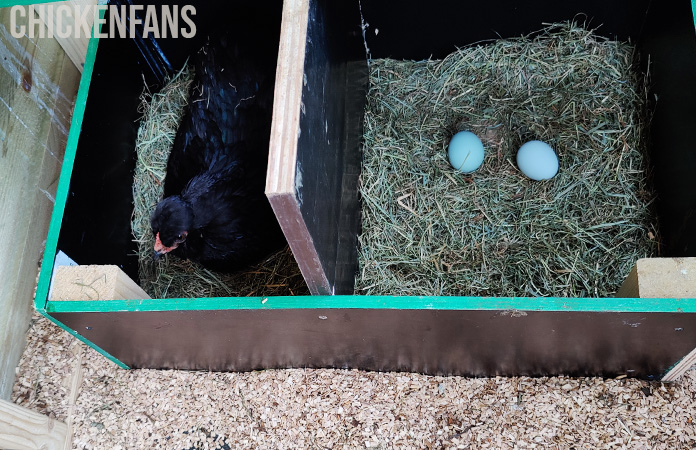
How Can I Maximize Egg Production?
There are plenty of things a chicken keeper can do to maximize the number of eggs, keeping your chickens’ health in mind.
- Provide high-quality feed: A healthy, balanced diet is essential for optimal egg production. Feed your chickens a diet that’s high in protein.
- Supplement their diet with calcium: You can give calcium-rich supplements such as oyster shells to help create strong eggshells.
- Ensure clean and fresh water: Water is critical for egg production, making up around 70% of the egg’s weight.
- Keep the run area clean and hygienic: Dirty, overcrowded living conditions can lead to stress, disease, and decreased egg production.
- Keep stress levels low: Chickens that are stressed or anxious are less likely to lay eggs.
As said before, don’t use any artificial light inside the coop during winter to increase egg production. A winter break is just what they need to stay happy and healthy.
How Many Eggs Does a Chicken Lay in a Lifetime?
Hens are born with a fixed set of tiny egg yolks growing in follicles in their ovary. The ovary releases the yolks to embark on their journey through the oviduct and become an egg. On average, hens will lay about 600 eggs during their lifetime, but it all depends on the breed.
It’s very hard to determine the average amount of eggs a chicken will lay during its life cycle, as some breeds mature slower, and others are often broody or have a less productive egg-laying cycle.
Most chickens reach sexual maturity around 20 weeks and will start laying then. Many hybrid chickens start laying sooner, around 17-18 weeks, and some heritage breeds, like Silkies or Cochins, mature slower.
Hybrid chickens will keep on laying until they die, as they have been bred to produce many eggs in a short period of time. Their first active laying year is the most productive.
Heritage breeds will live up to ten years and older but stop producing eggs around the age of 6 or 7. A retired laying hen can still be useful in a flock to show the new birds around.
What Chicken Breeds Don’t Lay Many Eggs?
Some chicken breeds are purely ornamental and don’t lay many eggs. Certain breeds, such as Japanese Bantams, are not good layers, bringing a maximum of 50 to 75 tiny eggs yearly. These birds aren’t kept for the eggs but for their unique appearance.
Other breeds that don’t bring many eggs:
- Silkies: Maximum 3 per week, but are often broody and don’t lay during winter.
- Malay chickens: 120 eggs per year
- Ayam Cemani: 100 eggs per year
- Pavlovskaya: 60 to 90 eggs yearly
- Bearded D’Uccle Bantam: 100 small eggs yearly
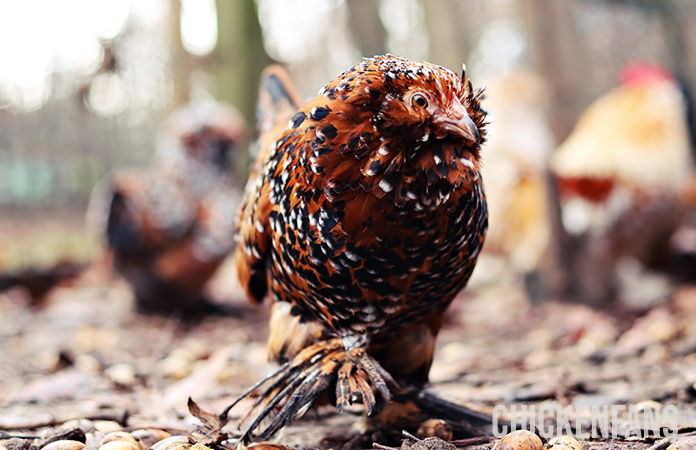
Summary
It takes around 24 hours for a chicken to produce an egg, so theoretically, they can lay one egg daily. In some rare cases, a chicken can lay two eggs per day, which is probably a malfunction in the egg-production cycle.
The number of eggs your flock will bring you depends on numerous factors, such as breed type, age, health, and living conditions. Hybrid chickens will lay up to 6 eggs per week, while heritage breeds lay fewer eggs, bringing around 4 to 5 eggs to the table.
On average, hens will lay about 600 eggs during their lifetime, but it all depends on the breed.
If you want to learn more about chicken breeds, check out our ‘Breeds‘ page, or go to the ‘Eggs‘ page to read more on egg abnormalities.



















